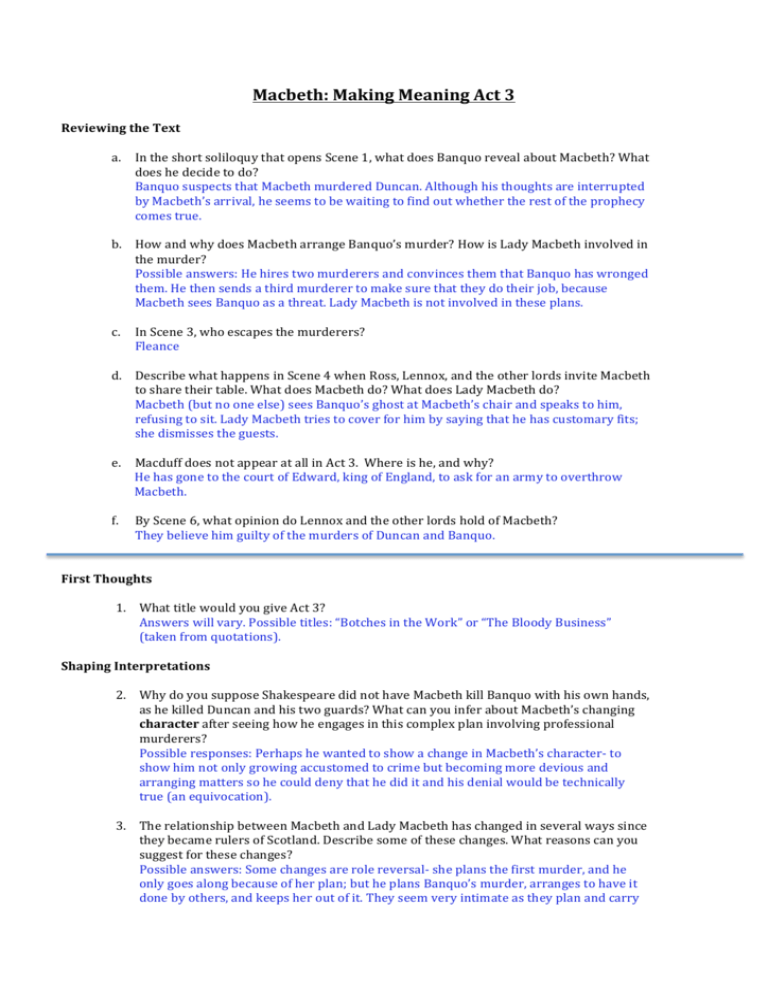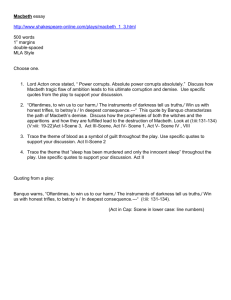Macbeth Act 3 Study Guide: Review, Interpretations, & More
advertisement

Macbeth: Making Meaning Act 3 Reviewing the Text a. In the short soliloquy that opens Scene 1, what does Banquo reveal about Macbeth? What does he decide to do? Banquo suspects that Macbeth murdered Duncan. Although his thoughts are interrupted by Macbeth’s arrival, he seems to be waiting to find out whether the rest of the prophecy comes true. b. How and why does Macbeth arrange Banquo’s murder? How is Lady Macbeth involved in the murder? Possible answers: He hires two murderers and convinces them that Banquo has wronged them. He then sends a third murderer to make sure that they do their job, because Macbeth sees Banquo as a threat. Lady Macbeth is not involved in these plans. c. In Scene 3, who escapes the murderers? Fleance d. Describe what happens in Scene 4 when Ross, Lennox, and the other lords invite Macbeth to share their table. What does Macbeth do? What does Lady Macbeth do? Macbeth (but no one else) sees Banquo’s ghost at Macbeth’s chair and speaks to him, refusing to sit. Lady Macbeth tries to cover for him by saying that he has customary fits; she dismisses the guests. e. Macduff does not appear at all in Act 3. Where is he, and why? He has gone to the court of Edward, king of England, to ask for an army to overthrow Macbeth. f. By Scene 6, what opinion do Lennox and the other lords hold of Macbeth? They believe him guilty of the murders of Duncan and Banquo. First Thoughts 1. What title would you give Act 3? Answers will vary. Possible titles: “Botches in the Work” or “The Bloody Business” (taken from quotations). Shaping Interpretations 2. Why do you suppose Shakespeare did not have Macbeth kill Banquo with his own hands, as he killed Duncan and his two guards? What can you infer about Macbeth’s changing character after seeing how he engages in this complex plan involving professional murderers? Possible responses: Perhaps he wanted to show a change in Macbeth’s character-­‐ to show him not only growing accustomed to crime but becoming more devious and arranging matters so he could deny that he did it and his denial would be technically true (an equivocation). 3. The relationship between Macbeth and Lady Macbeth has changed in several ways since they became rulers of Scotland. Describe some of these changes. What reasons can you suggest for these changes? Possible answers: Some changes are role reversal-­‐ she plans the first murder, and he only goes along because of her plan; but he plans Banquo’s murder, arranges to have it done by others, and keeps her out of it. They seem very intimate as they plan and carry out Duncan’s murder, now she is not even in his confidence, and he does not want to share with or depend on her the way he has before. The changes in their relationship are some of the effects of committing murder; perhaps they have lost trust in each other as they constantly distrust those around them. 4. In Scene 2, Macbeth describes his surroundings by saying, “Light thickens, and the crow/ Makes wing to th’ rooky wood.” How can these remarks also be seen as a metaphorical commentary on the events of the play? What other remarks by Macbeth function in this way? Possible answer: Macbeth’s words indicate the time in which the scene takes place, probably dusk-­‐ a time in which there is a blurring of distinction between light and dark-­‐ but in a metaphorical sense, he comments about the blurring between good and evil. Several other remarks can also be taken as both literal and metaphorical: For example, in Scene 4, II. 126-­‐127 again referring to the blurring of time in the scene and in the motif of reversal. In Scene 4, II. 78-­‐83 are directed at the ghost, literally but could be taken metaphorically to mean that past misdeeds have continued to haunt and “unseat” one. 5. How is Fleance’s escape a turning point in the play? Students might say that it is the first time that Macbeth’s plans have gone awry, and it leaves open the possibility that Banquo’s descendants will be king. 6. How does the banquet scene blur the clear-­‐cut and common sense distinction that most of us make between the real and the imaginary? In what other scenes has this distinction also been blurred? Possible answers: The scene plays upon the frightening possibility of madness. What seems to be real may not be, as Macbeth can see something at the table that no one else can see. Also, if an actor plays the ghost, then a supernatural being is present as if it had real existence, another blurring of distinction. This effect also may apply in the witches’ scene and to the descriptions of the natural world’s response to Duncan’s murder. 7. At the beginning of Scene 2, Lady Macbeth quietly tells herself, “Nought’s had, all’s spent/ Where our desire is got without content…” What does she mean? At this point, would her husband agree? Students might say that she is pointing out that they have committed a terrible crime-­‐ in effect, sold their souls-­‐ and yet fulfilling their ambitions has not made them happy. Macbeth thinks that it is still possible to achieve peace, if only he can kill Banquo and Fleance. 8. Nobody except Macbeth sees Banquo’s ghost. In some productions of the play, the ghost does not appear onstage; in others it does. If you were the director, which would you choose? What effect does having Banquo appear at the Banquet, made up as a ghost, create? What is gained by having it appear as though no person motivates Macbeth’s terrifying behavior? Possible answers: Have an actor play a ghost, use technology to project a ghost, use strong light over the chair to suggest the ghost’s presence, or have the ghost be a figment of Macbeth’s imagination. Banquo’s ghost in the flesh blurs the distinction between the real and the imaginary, and it would show the strong influence murder could have on the mind of the murderer. Showing no ghost on stage would emphasize that Macbeth is hallucinating. Extending the Text 9. After his vision of Banquo’s ghost in Scene 4, Macbeth finally accepts that “blood will have blood.” What does this phrase mean? Is it relevant to today’s world? How? (Synthesis) Possible answer: The guilty will be found and pay with their lives. It is relevant in regard to discussion of the death penalty, as society must decide if the murderer should pay with his or her life. Challenging the Text 10. Shakespeare never reveals the identity of the Third Murderer, introduced in Scene 3. Who do you think the murderer is? Do you think the introduction of this Third Murderer is a flaw in the play? Explain your response. (Evaluation) Possible answers: It may be one of the witches’ making sure that Fleance escapes so the prophecy would come true. Other possibilities are Ross, Seyton, or Macbeth. It is not a flaw, it adds to the creepiness; or it is a flaw because it distracts the audience’s attention from more important issues.







